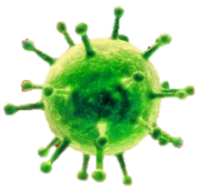
General Information
Coronaviruses are common viruses that most people are infected with during their lifetime. These viruses usually cause mild to moderate upper-respiratory tract illnesses, and are responsible for approximately one in every three cases of the common cold.
Middle East respiratory syndrome (MERS) is a viral respiratory disease caused by a novel coronavirus called “Middle East Respiratory Syndrome Coronavirus” (MERS‐CoV). MERS-CoV is from the same large family of viruses that includes the SARS (Severe Acute Respiratory Syndrome) virus. Both viruses are capable of causing severe disease. The virus has caused severe illness and death in people from several countries, and is much more deadly than any other coronavirus seen before.
MERS‐CoV was first identified in Saudi Arabia in 2012. Most people infected with MERS-CoV developed severe acute respiratory illness with symptoms of fever, cough and shortness of breath. About 30% of them died. A small number of the reported cases had a mild respiratory illness.
On May 2, 2014, the first U.S. case of MERS was confirmed in a traveler from Saudi Arabia who had travelled to the U.S. An additional MERS case has been identified in association with travel from Saudi Arabia to the U.S.
Investigators are trying to determine the source of it and how it is spread. The full picture on the source is not yet clear, but it is known that coronaviruses may also infect animals. Strains of the virus that match human strains have been isolated from camels in Egypt, Qatar, and Saudi Arabia. Human and camel genetic sequence data demonstrate a close link between the virus found in camels and that found in people. While it is possible other sources exist, studies support the premise that camels are a likely source of infection in humans.
Transmission
Most people will get infected with human coronaviruses in their life time. Young children are most likely to get infected, and people can have multiple infections in their life time. How human coronaviruses spread has not been studied extensively, but it is likely that human coronaviruses spread from an infected person to others through the air, by coughing and sneezing, or through close personal contact. These viruses may also spread by touching contaminated objects or surfaces and then touching your mouth, nose, or eyes.
It is not yet understood exactly how people become infected with MERS‐CoV. Most of the people infected so far have been older men, often with other serious medical conditions.
Because MERS-CoV does not spread easily from person to person, the risk of becoming infected is low. You are not considered to be at risk for the infection if you have not had close contact, such as caring for or living with someone who is being evaluated for infection.
Infection has occurred among family members and health‐care workers who are in close contact with or providing unprotected care to a patient or family member. Recently, there have been an increased number of reports of health care‐associated infections. At this time, there is no evidence of sustained spreading in community settings.
The incubation period for this is usually about five days, but can be as long as 14 days.
Symptoms
Human coronaviruses usually cause mild to moderate upper-respiratory tract illnesses of short duration. Symptoms may include runny nose, cough, sore throat, and fever. These viruses can sometimes cause lower-respiratory tract illnesses, such as pneumonia. This is more common in people with cardiopulmonary disease or compromised immune systems, or the elderly.
A typical case of MERS consists of fever, cough, and shortness of breath, and pneumonia is common. Gastrointestinal symptoms, including diarrhea, have also been reported. Severe illness can cause respiratory failure, and may require mechanical ventilation and support in an intensive‐care unit. Some patients have had organ failure, and a significant percentage have died. The virus appears to cause more severe disease in people with weakened immune systems, older people, and those with such chronic diseases as diabetes, cancer, and chronic lung disease.
Diagnosis
Laboratory tests can be done to confirm whether the illness may be caused by human coronaviruses. However, these tests are not used very often because people usually have mild illness, and testing may be limited to a few specialized laboratories.
Specific laboratory tests may include:
• Virus isolation in cell culture
• Polymerase chain reaction (PCR)
• Serological testing for antibodies
Nose and throat swabs are the best specimens for detecting common human coronaviruses.
Serological testing requires collection of blood specimens.
Lab tests for MERS-CoV are available at state health departments, CDC, and some international labs. Otherwise, MERS-CoV tests are not routinely available.
Treatment
There are no specific treatments for illnesses caused by human coronaviruses. Most people with coronavirus illness will recover on their own; however, some things can be done to relieve symptoms, such as—
- Pain and fever medications (Caution: Aspirin should not be given to children)
- Using a room humidifier or taking a hot shower to help ease a sore throat and cough.
- Sick people should drink plenty of liquids, and stay home and rest.
However, if symptoms are more acute, medical care may be required.
Prevention
There are currently no vaccines available to protect you against human coronavirus infections.
The following tips may help prevent respiratory illnesses:
CDC advises that people follow these tips to help prevent respiratory illnesses:
- Wash your hands often with soap and water. If soap and water are not available, use an alcohol-based hand sanitizer.
- Cover your nose and mouth with a tissue when you cough or sneeze then throw the tissue in the trash.
- Avoid touching your eyes, nose, and mouth with unwashed hands.
- Avoid close contact with sick people.
- Clean and disinfect frequently touched surfaces.
MERS Prevention in Healthcare
CDC is recommending that infection control guidance developed for SARS be implemented for patients with known or suspected MERS-CoV infection. Airborne and Contact Precautions, in addition to Standard Precautions, should be applied when caring for patients with known or possible MERS-CoV infection.
The following are recommendations based on the 2003 SARS outbreak experience:
Facilities should develop a “Respiratory Hygiene Plan” that addresses the following:
- Provide masks and hand hygiene products at all ports of entry to the health system
- Place masks on patients immediately if they are clinically tolerable
- Rapid triage symptomatic patients in designated areas (negative pressure)
- Immediate placement in isolation precautions
- Strict adherence to hand hygiene guidelines by healthcare workers
- Proper environmental hygiene
Since no disinfectant efficacy is currently available for MERS-Cov, Diversey recommends disinfectants effective against the human coronavirus.
See table of recommended disinfectants in the PDF link below.

